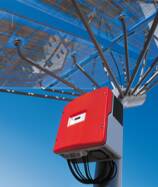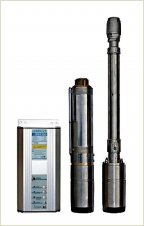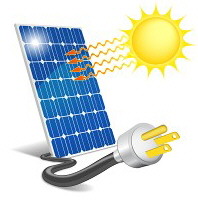Sustainability of solar systems
CI
How solar photovoltaic electrification works?
How solar photovoltaic electrification works?
Panels for water pumping system Guachal
A solar panel is a device that harnesses the sun's energy to generate heat or electricity. According to these two purposes, we can distinguish between solar collectors, which produce hot water (generally for domestic use) using solar thermal energy, and photovoltaic panels, which generate electricity from the solar radiation that falls on the photovoltaic cells of the panel.
Photovoltaic solar panels cost a multitude of cells, called photovoltaic cells, which convert solar radiation into electricity. Electricity is generated due to the "voltaic effect" caused by solar energy, generating positive and negative charges in two nearby semiconductors of different types, which generates an electric field that will produce electric current.
They are made up of a set of solar cells that are electrically connected to each other in series and parallel, until the appropriate voltage for use is achieved. Photovoltaic modules admit both direct and diffuse radiation, being able to generate electricity even on cloudy days.
The most commonly used materials to make these cells are gallium arsenide and silicon. Silicon cells are the most common and widely used. Depending on the arrangement of the silicon atoms, there are different photovoltaic cells: Crystalline photovoltaic cells (Polycrystalline: when they are made up of small crystallized particles and Monocrystalline: they are made up of sections of a single silicon crystal.) and amorphous photovoltaic cells (when the silicon has not crystallized).
WHAT IS PHOTOVOLTAIC ENERGY AND ITS ADVANTAGES
Within the solar panels, we find photovoltaic solar energy, which is that which is obtained by converting sunlight into electricity, using a technology based on the photoelectric effect.
It is a type of renewable, inexhaustible and non-polluting energy that can be produced in facilities ranging from small generators for self-consumption to large photovoltaic plants.
The advantages of this energy are the following:
It is a type of renewable, inexhaustible and non-polluting energy, so it contributes to sustainable development.
It is a particularly suitable system for rural or isolated areas where the power line does not reach or its installation is difficult or expensive, or for geographical areas whose climate allows many hours of sunshine per year.
It is modular, so it can be built from huge photovoltaic plants on the ground to small panels for roofs.
The profitability, the absence of polluting emissions and the inexhaustible nature of photovoltaic energy make it, beyond any doubt, the energy source of the future.
But we still have to ensure that the design of photovoltaic installations, their materials and installation processes have a minimal impact on the natural environment. The sustainability of these facilities is not a new issue. In fact, concern about the impact on the environment has fueled an important part of the R&D efforts of manufacturers in the sector around the world in recent years.
HOW PANELS AND ENERGY INFLUENCE WITHIN THE HOTEL SECTOR
Within the renewable energy sector, photovoltaic solar panels are the most used option in hotels and tourist accommodation to reduce their electricity bill. These panels capture the sun's rays and take advantage of its energy to produce hot water and electricity in all the hotel rooms, achieving energy savings of up to 50%; but it is not the only advantage. Betting on green energy is the best option in the tourism sector.
There are many options that we can consider in hotels, hostels and rural houses. From creating solar parking areas so that hotel guests can park and protect their vehicles, to biomass boilers for heating and DHW.
In the case of betting on the placement of solar panels, we will achieve multiple benefits for the accommodation:
Sustainable hotels (Efficient hotels and rural houses help us build a more sustainable society).
Natural energy source (The sun is the main source of energy in solar panels, a natural, clean and renewable energy. Thanks to solar panels we can produce heat and electricity without using fossil fuels (polluting emissions)).
Energy saving (Solar energy allows hotels to save up to 50% more on heating and electricity with photovoltaic self-consumption systems).
Minimum maintenance (Solar panels are durable pieces and require very little maintenance. Unlike other photovoltaic self-consumption systems, once installed in the hotel, we would hardly have to worry about the panels again).
Subsidies for the tourism sector (The main problem with the installation of these panels is that their initial investment is high, a problem that we can reduce thanks to the subsidies allocated to the tourism sector).
We can conclude this topic by reflecting on what the future will hold for us both in terms of solar panels, as well as the importance and influence within the tourism sector that surrounds us.
Fuente sensitur.com/sostenibilidad-y-paneles-solares
Solar electric systemsindependent and GRID injection (electrical network). Backup and protection of medical and computer equipment, radio communication, electric fences, cogeneration together with electro-thermal generators, air conditioning, etc.
Free solar hot water with solar collectors with vacuum tubes. thermosiphon type thermal systems, forced, with automatic thermostats or heaters. Higher performance than flat plate collectors. Room temperature control for the industry Guarantee and technical service of course.
Photovoltaic water pump systems that do not require batteries so the return on investment is very fast. These systems work fully automatic.




